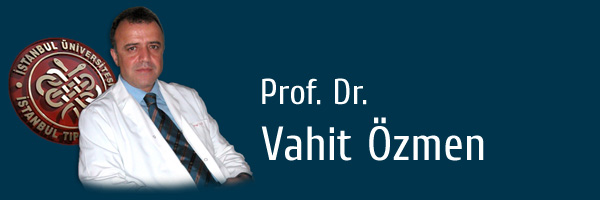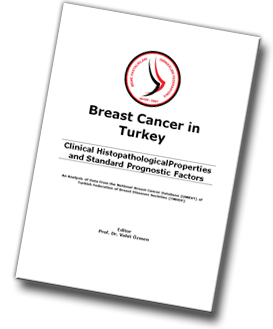Prof. Dr. Vahit Ozmen has written a new book titled “Breast Cancer in Turkey” “Clinical Histopathological Characteristics and Standard Prognostic Factors”
This book includes analyses of 13.420 breast cancer patients from the National Breast Cancer Database (UMKVT) of Turkish Federation of Breast Diseases Societies (TMHDF).
Primary aims of this publication were to reflect the results of analyses of breast cancer patients by gender, age, menopausal status, clinical and pathological stages, histological type of invasive cancer, tumor diameter, histological grade, pathological lymphatic stage, hormone receptor, HER (c erb B2) expression and molecular subtype of breast cancer. These results were also compared with the results of developed and developing countries.
Dear Reader,
As a breast surgeon, I always asked an important question to myself in all scientific meetings: Why do we not have a regular breast cancer registry in Turkey and why do we not have statistics and data for our own patients? We were trying to conduct and publish clinical studies using data from the patient database at the Breast Unit, which we established back in 1986 when I was the Chief Resident at General Surgery Department of Istanbul Medical Faculty. But it has now become a scientific obligation to create a “National Breast Cancer Database”, collecting data of breast cancer patients from different regions and cities across the whole country.
The project, “National Breast Cancer Database (UMKVT),” which I had presented in December 2004 during the Board Meeting of the Turkish Federation of Breast Diseases Societies (TMHDF), originally initiated during the 1st Annual Meeting of the World Society for Breast Health in Istanbul, 2001, was accepted and a decision was made to implement the project. We contacted Pleksus Bilişim Teknolojileri and signed an agreement with them in the name of our federation. After intensive studies, Pleksus formed a committee and the federation determined the type of information and questions the breast cancer registry would need to ask. Special courses were organized for associates at centers that would take part in the registry. The National Breast Cancer Database was officially launched for use in May 2005, with both an online and an offline version. Taking account of the numerousness of questions and the difficulty of using the software, a number of changes were made with the database in 2009, which then were published in a book, designated Version 2. After these modifications the registry became faster and user-friendlier. Upon a decision of the Federation Board of Directors, it was decided to compile the information in a book and make it available to national and international science communities. I do hope and believe that this book, which will be also translated to English, will represent a significant contribution to accessing scientific data on women in Turkey who were diagnosed with and are being treated for breast cancer.
Pruning and analysis of data presented in this book was performed by Dr. Nilüfer Özaydın from Public Health Department of Marmara University Medical School. Prof. Dr. Bahadır Güllüoğlu and Dr. Ersin Selçuk Ünal also made valuable contributions to preparing this book.
Scientists typically neglect their spouses and children throughout their careers, but this does not change the fact that they are our greatest source of support, allowing us to continue producing our work. Therefore, they do have a large contribution in our work, which we are able to create through long efforts, and for that I extend my gratitude to our families.
I also thank our former and new colleagues on the board of directors, who gave their full support for all scientific projects since the inception of our Federation, and Novartis Oncology Turkey who provided financial support to our project from day one, and our patients whose data we have used in this project.
Sincerely,
Prof. Dr. VahitÖzmen
Editor

